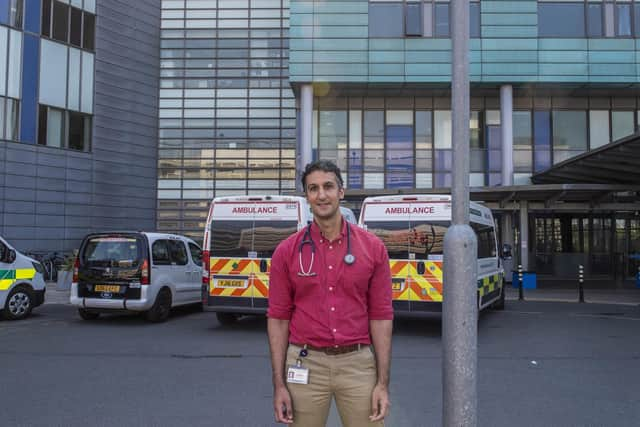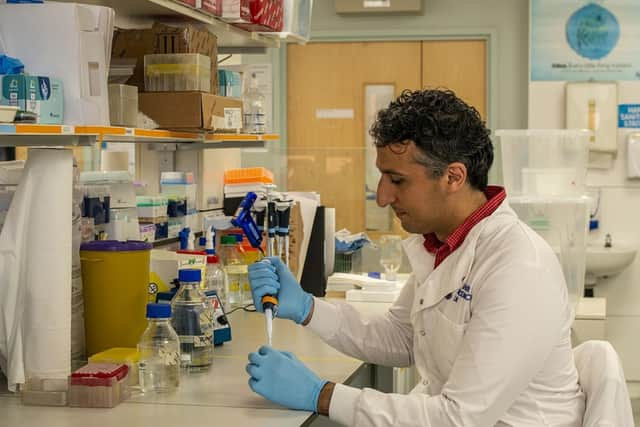Meet the Leeds professor working to treat otherwise incurable cancers
“His cancer has all but disappeared,” Prof Samson says. “He’s a young patient with a family and he’s doing really well now. He can see a future ahead for himself.”
Prof Samson is a Professor of Cancer Medicine and Immunotherapy based at the University of Leeds.
Advertisement
Hide AdAdvertisement
Hide AdHe specialises in research around both immunotherapy – treatment using a person’s own immune system to fight cancer, and oncolytic viruses – those which can replicate in cancerous tumours to essentially infect and destroy cancer cells.


Prof Samson leads a portfolio of oncolytic virus clinical trials, focusing particularly on whether oncolytic viruses and immunotherapy used together can improve outcomes for patients.
The thinking, he explains, is that the viruses break down any resistance mechanisms that the tumour has against immunotherapy, providing an effective treatment.
He’s back and forth most days between St James’s Hospital and his university-based laboratory research group made up of postdoctoral researchers, technicians and PHD students.
Advertisement
Hide AdAdvertisement
Hide AdThe work they’re doing on the study of cancer medicine and immunotherapies relates directly to treatment opportunities for patients.


“We’re working to bring forward treatments that we’ve designed in a laboratory into patient clinical trials," Prof Samson explains.
“It’s incredibly gratifying in that we are treating patients who have usually exhausted the standard treatments available to them. We are treating them with experimental therapies that are combinations of oncolytic viruses with other drugs. And we do have some successes.”
The young man with melanoma is one of them.
“It’s an experimental therapy so it doesn’t always work,” Prof Samson cautions. “But for those patients where it doesn’t work we need to find out why and if we can make it work, if we can improve outcomes for everyone. And that’s where the laboratory comes back in again.”
Advertisement
Hide AdAdvertisement
Hide Ad“Treating any patient is worthwhile whether they do well or less well,” continues Prof Samson, an honorary consultant in medical oncology.
"It’s incredibly important and rewarding to take them through that treatment period and look after them, regardless of outcomes.
"But when we do have patients that do really well, it sticks in your mind and makes a big difference. Those successes should be celebrated. We look to see why this patient responded so well and whether there’s an avenue we can go down to get more successes like it.”
Prof Samson is focused especially on cancers that start in the liver.
Advertisement
Hide AdAdvertisement
Hide Ad“We’re getting a rapidly increasing number of patients that have liver cancers,” he says. “The incidence has quadrupled in the past 30 years, because of the peak in hepatitis viruses in the 1980s...and because of rising obesity tied to diabetes."
Until recent years, there were very few drug treatment options for patients with liver cancer, Prof Samson says, but in the past few years, immunotherapies have been developed to help treat liver cancer.
"And it’s made a huge difference. Now there is some hope that we can offer people, there is a treatment that does work and does extend their lifespan.
"But it doesn't work as well as we’d like it to, and that’s where the research comes in. We’re seeing that if we use an oncolytic virus, alongside immunotherapy, it can really improve the outcomes.”
Advertisement
Hide AdAdvertisement
Hide AdOther research work is focused on the development of cancer vaccines.
"A vaccine is putting in a small protein that will directly educate the immune system about the tumour,” Prof Samson says. “It might be that we can put in a bit of tumour, a bit of genetic material that codes for the tumour, into the vaccine and use that as a cancer vaccine alongside immunotherapies.
"We would probably start that in patients who have the most advanced cancer, and if we can show that it works there, we would look to put that same treatment into patients that have much earlier disease as a preventative measure.”
